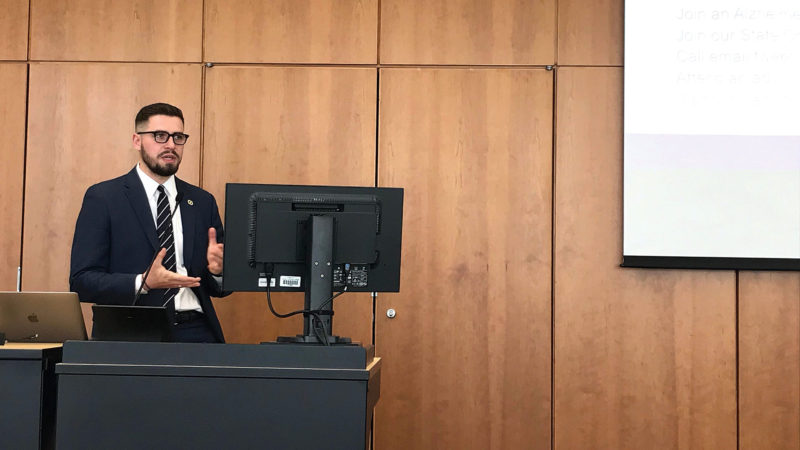Trio of Bills Aim to Ease Burden on Families Battling Alzheimer’s
No One Left Behind
By MARK MORRIS
Imagine receiving a diagnosis for a serious illness and then having to figure out how to deal with it on your own.
That’s what Kaileen Dougherty’s family faced when her mother was diagnosed with Alzheimer’s disease at age 56. Because she was too young to qualify for financial assistance from any state or federal Alzheimer’s programs, the burden of care fell completely on the family.
“There was no history of Alzheimer’s in our family, so there was a lot to learn because we just had no experience with it,” she said.
Dougherty and her father took care of her mother at home until they became concerned for her safety. “My mom became very fearful of her home and tried to run away. Even though it was a safe place, she didn’t think it was.”
When it came time to move her mother to an assisted-living facility, the Dougherty family had to absorb the impact of paying $7,000 a month for care. “We were fortunate that my dad had equity in our home and could borrow against the mortgage,” Dougherty said, but he still had to take out additional loans to cover all the costs related to her care.
Dougherty’s mother was about to be transferred to another facility, but before that could happen, her father had to pay $10,000 by check within 24 hours before the new facility could accept the transfer. Dougherty’s mother, then age 63, died before the transfer was made.
“On a lot of levels,” she said, “we feel the system failed us.”
Dougherty told this story at a recent legislative breakfast of the Massachusetts/New Hampshire Chapter of the Alzheimer’s Assoc. to support legislation that specifically addresses early-onset Alzheimer’s and dementia by expanding access to state elderly services for Alzheimer’s patients regardless of their age.

Approximately 200,000 Americans have early-onset (also known as younger-onset) Alzheimer’s disease. At the federal level, bipartisan legislation was introduced in March to allow early-onset patients to access services before age 60. Daniel Zotos, director of Public Policy and Advocacy for the local Alzheimer’s Assoc. chapter, said the Massachusetts bill is an important step toward improving access for people with early-onset Alzheimer’s and dementia.
“There are costs associated with extending these services to younger ages, but they are not as drastic as some might assume, because those with early onset are a smaller subset of the larger Alzheimer’s population,” Zotos said. “Though smaller, it doesn’t mean they are any less important.”
Multiple Fronts
The early-onset bill is one of three pieces of legislation the Alzheimer’s Assoc. is sponsoring. Zotos predicted the bills will be taken up by the state Legislature sometime in late summer or early fall.
In August 2018, Gov. Charlie Baker signed a law creating an integrated plan to address Alzheimer’s and dementia at the statewide level. The law calls for a more comprehensive approach to fighting the disease by establishing a permanent advisory council to coordinate government efforts and ensure that resources are maximized and leveraged.
Current data shows that 50% of Americans with Alzheimer’s are not diagnosed, and only 45% are told of their diagnosis. In response to those statistics, the new law mandates curriculum content on Alzheimer’s and dementia to be included in continuing-education programs that are required for licensing medical professionals. Proper family notification is also part of the law.
In Massachusetts, dementia patients have a 22.5% readmission rate within 30 days of leaving the hospital, the sixth-highest rate in the nation. The new law requires hospitals to have an operational plan to better manage patients with Alzheimer’s and dementia.
“When you think about someone being re-admitted to a hospital in a 30-day period, it makes you ask, ‘why did that happen?’” Zotos said. “From medications to urinary-tract infections, problems start to happen when a person’s medical situation isn’t managed properly.” He added that the new law will ensure better patient outcomes and prevent unnecessary and expensive hospital stays.
The 2018 law was an important accomplishment, he added, but there’s more work to be done.
In addition to the legislation that specifically addresses early-onset Alzheimer’s, Zotos is optimistic about a bill that puts a focus on dementia-care coordination. Designed for patients and their caregivers, the bill makes it easier for families to get consultations from trained dementia experts and develop an individualized care plan for their loved ones.
“When we look at the lack of services after a diagnosis, it’s similar to where cancer was in the 1970s,” Zotos told HCN, adding that, when patients received a cancer diagnosis back then, there was rarely any follow-up by the medical system, especially with the more acute diagnoses.
MassHealth runs a program called Senior Care Options (SCO), which is a comprehensive health plan that covers all the services reimbursable under Medicare and MassHealth through a network of providers. The bill would require all health plans participating with SCO to provide dementia-care coordination to those with Alzheimer’s and related dementias.
Upon diagnosis, Zotos said, the clinician would make a report to the Alzheimer’s Assoc., where a second clinician, often a staff member, would help caregivers figure out the next steps. “They’re holding your hand in this process. They know what services exist in the community and can help caregivers build out a coordinated care plan.”
Studies have shown that, with coordination, quality of care and quality of life improves for the patient and results in fewer negative outcomes, he noted.
“We’ve seen that, when you have coordinated care, there are fewer hospital admissions and later nursing-home admissions, which is more compassionate for patients and their families. In addition, it reduces costs to the entire system.”
A third bill discussed at the breakfast would provide a tax credit for family caregivers. Estimates show that family caregivers spend an average of $7,000 per year on out-of-pocket expenses. The proposed bill, endorsed by the AARP, would allow caregivers an income-tax credit for eligible expenses up to $1,500.
During a question-and-answer session, one attendee criticized the $1,500 tax credit as “a pittance” compared to what caregivers spend. Zotos acknowledged this reality and said his group supports the bill from a pragmatic standpoint because it at least establishes a tax credit that can be built on in the future.
Good Ideas Spread
The success of last year’s Massachusetts law to address Alzheimer’s and dementia with a comprehensive plan has inspired other states to get serious about tackling the disease. Zotos said Connecticut and Rhode Island have passed similar laws, and New Hampshire, Vermont, and Maine are all considering comprehensive planning legislation to address Alzheimer’s.
While no one piece of legislation is a silver bullet, he admitted, “by taking an incremental approach, we can really have influence and start to change the narrative around Alzheimer’s.”



